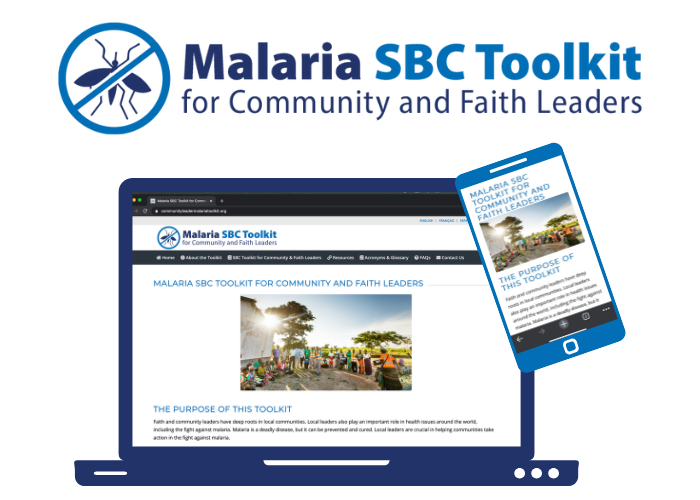“In Kasungu, Malawi, communities suffer a lot from malaria,” said Alikanjero Kanyemba, a local faith leader. “Faith leaders need to face this perennial monster.”
In addition to his work as a local faith leader, Alikanjero serves as the Chairperson of the Kasungu District Interfaith AIDS Committee of the Malawi Interfaith AIDS Association. Founded in 2003 and re-envisioned in 2018 to include malaria in its scope of work, the Malawi Interfaith AIDS Association coordinates a faith-based response to health through a gender sensitive and rights-based approach.
As Chairperson, Alikanjero works with faith leaders from five Christian and Muslim denominations to include messages on malaria prevention and care in their sermons and other interactions with their communities, including funeral ceremonies, market days, and group meetings.
“In our communities, the number one source of advice is from faith leaders they know and trust,” shared Alikanjero. “Faith leaders are very important in assisting communities to take action against malaria through social and behavior change activities. Faith leaders have opportunities to share important information about malaria.”
With funding from UNICEF, the Malawi Ministry of Health, National Malaria Control Program, and the Malawi Interfaith AIDS Association partnered to train local faith leaders on malaria social and behavior change under the Zero Malaria Starts with Me campaign.
To create the training, the National Malaria Control Program used the Malaria Social and Behavior Change Toolkit for Community and Faith Leaders, an online resource created by the U.S. President’s Malaria Initiative and Breakthrough ACTION.
The Malaria Social and Behavior Change Toolkit contains resources to learn about malaria, tools to communicate effectively and create lasting behavior change, a list of key actions to promote the fight against malaria at the local level, steps for integrating malaria into current work, and strategies for advocating for malaria control and prevention. The toolkit provides all the resources and tools needed for faith leaders to help their local community change their everyday actions to prevent malaria and to quickly and safely treat malaria if they become sick.

The Malaria Social and Behavior Change Toolkit is a free online resource for community and faith leaders.
Using the toolkit, the Malawi Interfaith AIDS Association and National Malaria Control Program trained 18 faith and community leaders from across the country to effectively promote key malaria prevention behaviors during sermons and community gatherings. Key messages include statements like “every household member should sleep under an insecticide-treated net every night,” “properly care for and maintain your insecticide-treated net,” and “know the symptoms of malaria and seek care within 24 hours at a health facility or with a community health worker.”
Taonga Mafuleka of the Malawi Ministry of Health was involved in organizing the training. He shared, “Leveraging the Malawi Interfaith AIDS Association’s national presence and their obligation to protect and care for vulnerable populations, and inspired by their compassion and service to others, the National Malaria Control Program engaged the association’s district and community-level structures and oriented them on how to effectively promote malaria key behaviors at the congregational and household levels.”
Alikanjero was one of the first people to take part in the Malawi Interfaith AIDS Association and National Malaria Control Program’s training for faith leaders on malaria social and behavior change. Today, he uses what he learned to lead a weekly malaria education session for new mothers at his local hospital. Alikanjero has shared the importance of preventing malaria and seeking care immediately for children with fever, with more than 360 new mothers since starting the program in July 2021.
As the Chairperson of the District Interfaith AIDS Association, Alikanjero is also spreading his knowledge about malaria social and behavior change by training 86 local faith leaders and 18 local stakeholders from various community groups. Together, Alikanjero and the other 17 leaders who participated in the original training have shared their knowledge with over 600 faith leaders across the country.
Having witnessed the impact made possible by equipping faith leaders with community engagement and behavior change skills, Alikanjero is optimistic about the future. He shared, “Creating a community-based movement to increase awareness and ownership of malaria interventions protects the most vulnerable families and communities from malaria.”
Alongside his community of interfaith leaders, Alikanjero is prepared to face malaria, the “perennial monster,” with social and behavior change.
Cover photo: Malawian Faith leader Alikanjero M. Kanyemba is using social and behavior change methods to improve malaria outcomes
